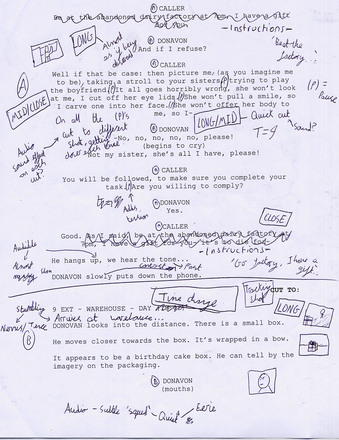“My screenplay still contains a timeless, viable story, but the technology in it has evolved, and it’s a total pain in the ass,” sighs Unguent.
Indeed, the results of a study commissioned by an independent writer’s advocacy group reveals that a staggering 98.8 % of unemployed screenwriters are completely fed up with how many times they have to go back into old spec scripts and change references to outdated technology.
“It’s beyond annoying,” reports Santa Monica based movie scribe Earl Kitella. “The conventional wisdom is that you never know when one of your scripts will hit, so you have to keep them all around. Only problem is, the ones you wrote a while back still have payphones, and the ones you wrote in the early 2000s don’t have enough references to social media.”
As a result, says Kitella, “A perfectly good writing sample has to be gone through with a fine-toothed comb, just so you can make sure people are using cell phones and Facebook enough.”
“That’s only the beginning of the hideous grind,” affirms Joy Dunton, a New York-based screenwriter. “Do you know how many times I’ve had to go through and change he flips his phone closed to he hangs up his phone? I mean, damn, I wrote this really strong script back in 2006, and now my agent won’t even show it until I get rid of all the flip phones.”
And it doesn’t end there.
“Can you say video rental store?” asks Norman Willoughby, Chicago-based television writer. “I had a whole scene set in one of those places, in this great script I wrote in 2003. Now what do I do? Move it into an apartment where they’re doing a search on their Roku? The inherent dynamism I was going for with the interaction in the video store is completely lost.”
The list of complaints goes on. From scenes in which people are stumped by trivia that must be altered in order to depict them Googling the answer on their handheld devices, to portable cameras needing to be replaced with smartphones that take selfies, to entire suspense movie plots which disintegrate now that people can share photos on Instagram.
Similarly, searching one’s document for a phrase such as Match.com in order to replace it with a trendier pop culture phenomenon like Tinder is commonplace. “And you just know that a month from now we’ll be bumping Tinder for the next hook-up app that we’ll need to include to keep our material on the cutting edge,” adds Dunton. “And by the way, don’t get me started on apps, or tapping your card at the cash register instead of swiping it, or using an actual flashlight instead of the one on your phone. Yeesh. They don’t pay me enough for all these revisions. Come to think of it, they don’t pay me at all.”
Perhaps the granddaddy of all pre-early 21st century technology that did not appear regularly in prior scripts is text messaging.
“Oh, hell, yeah,” Willoughby opines, “Heaven for-freaking-bid your script should have anyone under 30 actually using their cell phones to talk anymore. And, my God, it is insanely difficult to make text exchanges exciting on screen — people go to movies to watch them, not read them! It’s a visual medium! Hitchcock would be completely f**ked in 21st Century Hollywood.”
The study reveals that it could be another ten years before every spec script’s reference to a DVD or Blu-ray is replaced with a reference to a streaming service; before every use of a map is replaced with an on-board navigation system; before every external answering machine is finally replaced with voicemail. And by then, things could have changed completely once again.
“Most of these unemployed screenwriters have day jobs,” the study’s lead researcher observes. “They just don’t have time to go into every one of their old masterpieces and make sure it is up to date.”
Many have considered leaving their screenplays alone and simply choosing to keep their stories set in the previous two decades.
“But that’s a slippery slope,” says Joy Dunton. “Those were some pretty boring years.”



